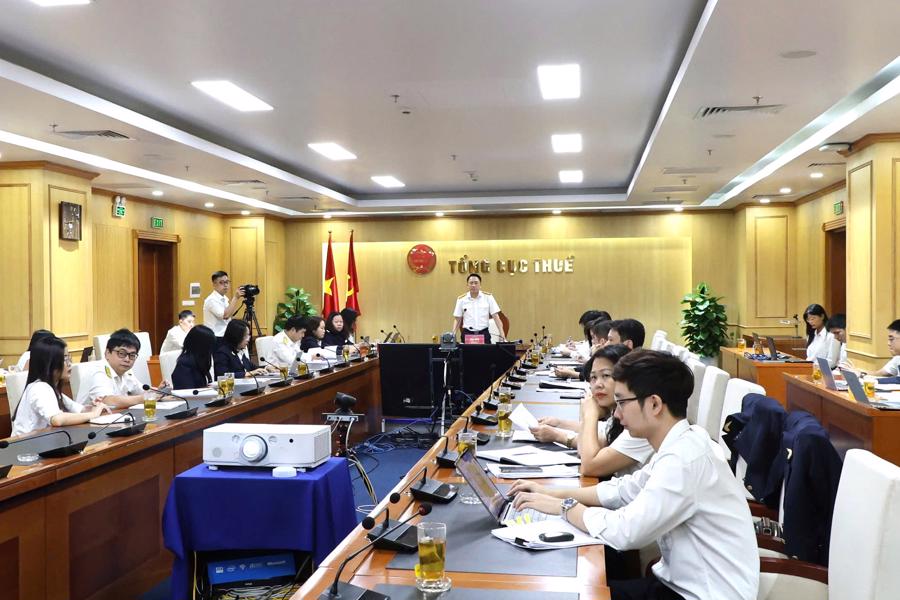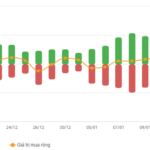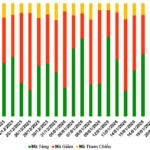On November 25, the General Department of Taxation held an online meeting to review and evaluate the application of the Portal for households and individuals to register, declare, and pay taxes for their e-commerce business activities.
Speaking at the meeting, Mr. Mai Son, Deputy Director General of the General Department of Taxation, said that along with the development of the digital economy, the business activities of households and individuals have also grown rapidly, not only in traditional models such as having shops, stores, or fixed business locations, but also in many new forms.
With the rapid growth of households and individuals doing business or collaborating with organizations in the sharing economy, cross-border digital content service provision, and other modern models, the tax industry needs to adopt new approaches to manage household taxes appropriately. This will enable the tax authorities to better perform their assigned tasks while also accompanying and supporting taxpayers in fulfilling their rights and obligations fully, quickly, and conveniently.
“Recognizing the importance of this, the General Department of Taxation reported to the Ministry of Finance and received approval to develop the Portal for households and individuals to register, declare, and pay taxes for their e-commerce business activities,” Mr. Mai Son clarified. “The portal aims to provide a convenient and user-friendly platform for taxpayers while also meeting the needs of modern and transparent tax management.”

After numerous discussions and meetings, the development of the Portal for households and individuals to register, declare, and pay taxes for their e-commerce business activities has been essentially finalized. The testing of applications on the interface, as well as the solutions and methods of operation, has been completed, and the portal is now ready to be implemented in practice.
“Following the directives of the Ministry of Finance and the General Department of Taxation, the specialized units have organized several meetings to discuss and finalize the deployment of the E-Commerce Portal, which comprises five main functions: (i) login; (ii) tax registration; (iii) declaration; (iv) tax payment; and (v) inquiry. Additionally, the portal offers supportive features such as (i) user guides and (ii) feedback reception from taxpayers.”
Ms. Nguyen Thi Lan Anh, Head of the Department of Small and Medium Enterprise Taxation and Households and Individuals
The official implementation of this portal in tax management is of utmost importance due to the rapid growth of households and individuals in the e-commerce field. Therefore, before the official launch of the portal, the leaders of the General Department of Taxation requested the specialized units and local tax departments to take full responsibility and continue providing feedback on each component of the application based on the tax management realities of their respective localities.
Subsequently, the Department of Information Technology will finalize and introduce the portal to support households and individuals engaged in e-commerce activities.
Reporting at the meeting, Ms. Nguyen Thi Lan Anh, Head of the Department of Small and Medium Enterprise Taxation and Households and Individuals (General Department of Taxation), stated that the Portal for households and individuals engaged in e-commerce activities would provide an additional support channel for all such households and individuals in registering, declaring, and paying taxes conveniently.
“The portal will offer maximum support and create the most favorable conditions for these households and individuals to easily register, declare, and pay taxes in a simple, convenient, and user-friendly manner,” emphasized Ms. Lan Anh. “It will also enable them to access comprehensive information about tax policies and their tax obligations through the provision of business guides, interactive features, and utilities that facilitate easy operation and use.”
During the meeting, representatives from the specialized units and local tax departments shared their assessments of the portal’s development and expressed their expectations that it would provide a supportive channel for households and individuals engaged in e-commerce activities to conveniently register, declare, and pay taxes.
However, some participants also expressed concerns due to the unique nature of e-commerce as a new field. They suggested that during the implementation process, it would be necessary to continue researching and incorporating relevant applications to further enhance the portal’s user-friendliness and maximize support for taxpayers.
The Great 1688 Shopping Festival: A Bonanza of Deals for Vietnam
In a swift move, China’s leading wholesale e-commerce platform, 1688, has launched a series of promotions and marketing campaigns targeted at Vietnamese consumers, just shortly after its Vietnamese language version went live. With competitive pricing compared to domestic e-commerce platforms, 1688 is making a bold statement in the Vietnamese market.
The Secret to Converting Online Sales: Unveiling the Monthly Order Numbers of Vietnamese Shoppers
The average Vietnamese consumer shops online four times a month, and the country’s e-commerce and digital economy sectors are poised for even more robust growth.
The E-commerce Floor and Digital Platforms: A Case for Corporate Income Tax
The government has proposed a new regulation requiring foreign businesses providing goods and services through e-commerce and digital platforms to pay taxes on their taxable income derived from Vietnam. This proposal aims to ensure that foreign enterprises doing business in Vietnam’s digital landscape contribute their fair share to the country’s tax revenue.




















